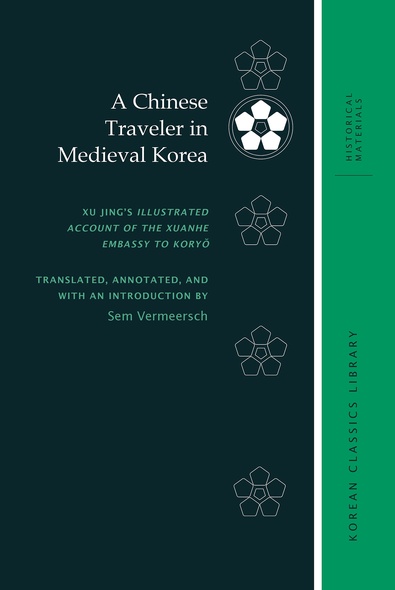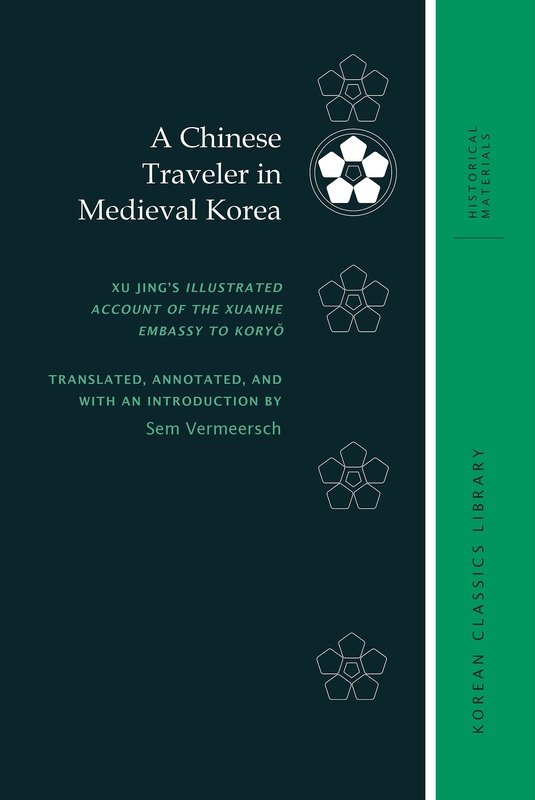
A Chinese Traveler in Medieval Korea
Xu Jing’s Illustrated Account of the Xuanhe Embassy to Koryŏ
"The king and ministers, superior and inferior, move with ritual and refinement. When the king goes on an inspection tour, everyone has the correct ceremonial attributes and the divine flag [troops] gallop in front while armored soldiers block the road. The soldiers of the Six Divisions all hold their attributes. Although it is not completely in uniformity with classic rites, compared with other barbarians it is splendid to behold. This is why Confucius thought it would not be a shame to reside here. And is not moreover Kija’s country a close relative of the hallowed dynasty?"
So observed the Song envoy Xu Jing in the official report of his 1123 visit to Korea—a rare eyewitness account of Koryŏ (918–1392) society in its prime. Officially, the purpose of Xu Jing’s visit was to condole the new king, Injong, on the death of his father and present him with a letter of investiture; unofficially, he was tasked with persuading Injong to align with Song China against the newly emergent Jin dynasty. Although famous for its celadon and Buddhist paintings, the Koryŏ period is still very much terra incognita in world history because of the lack of translated source materials. The present work, the first fully annotated, complete translation of a key source text on Koryŏ, fills this gap.
Xu Jing spent a little more than a month in the Koryŏ capital, Kaesŏng, but he was a meticulous chronicler, compiling a veritable handbook on Koryŏ that is full of fascinating details found nowhere else on daily life, history, customs and manners, buildings, the military, food, among others. However, Xu Jing was not unbiased in his observations and supplemented his work with unreliable information from earlier chronicles—a fact often ignored in previous studies of the Illustrated Account. In a substantial introduction to his translation, Sem Vermeersch not only places this important work in its historical context, but also reveals both the sources used by the author and the merits and limits of his observations, allowing historians of medieval Korea to make fuller use of this singular primary source.
There are some 40 reports translated in the book, detailing the founding of the Korean country, its dynastic lineage, the cities, prominent gates, palace halls, official dress, famous Koreans of the time, the military, the arms and weapons, flags and pennants, religion of Taoism and Buddhism the common people, the women, pottery, shipping and shipping lanes. All the reports provided remarkable detail and actual routine.
In his outstanding annotated translation Vermeersch has set a high standard for the translation of classical texts on Korea. The translation itself is lucid and eminently readable and supported by a wealth of scholarship on the Koryŏ and Song dynasties. Vermeersch is to be applauded for his unstinting labors in bringing this important text to a wider readership, and it is to be hoped that his work will encourage other scholars to engage in similarly valuable endeavors that are so substantially helpful in developing the field of Korean historical studies outside Korea. This work is a must have for any serious scholar of Korean history and indispensable for those specializing in the Koryŏ period.
Vermeersch’s A Chinese Traveler in Medieval Korea stands as a significant contribution to the field...the volume’s extensive introduction and critical translation are both extraordinarily accessible. The latter itself would be particularly well suited as a primary source for undergraduate introductions to Korean or Chinese history, not least because of its sheer scope and intriguing foci. Furthermore, it could most certainly serve as a topic for intensive graduate-level study. In either case, Vermeersch deftly fills a lacuna in English-language scholarship on Koryŏ Korea, and provides future generations of scholars and students with a solid springboard for continued research.





